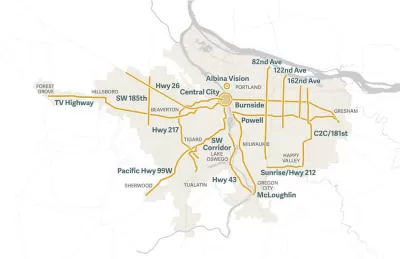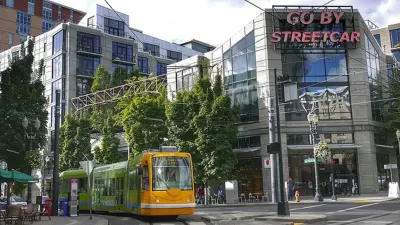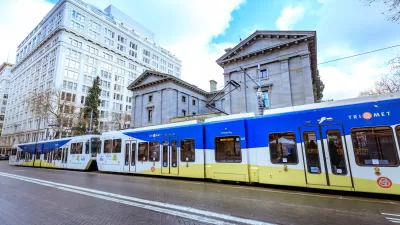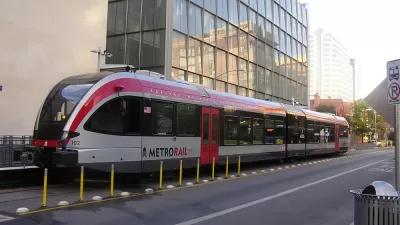The Get Moving 2020 transportation plan will face voters in thee Portland, Oregon region in November.

In July, the Metro Council, the regional planning organization for the Portland, Oregon area, finalized a historic ballot measure for consideration by voters in November. The "Get Moving 2020" plan requires voters to approve a $7 billion bond to fund safety, transit, and other transportation projects in Multnomah, Washington, and Clackamas counties.
"Among other investments, the measure would extend the MAX from downtown Portland to Tualatin, connect a regional rapid bus network, repair and replace bridges, complete sidewalks and pedestrian crossings on major roads, and upgrade thousands of traffic signals and streetlights," reported Chris McGinness back in July.
The bond would be financed with a new .75 percent payroll tax on businesses that the Metro Council claims will only apply to 10 percent of businesses in the region, with an exception for small businesses. That tax provoked opposition to the measure from the Portland Business Alliance, according to McGinnis.
The Metro Council has created a website to provide more information on the expenditure plan and governance of the proposed bond. Here's how that website summarizes the Get Moving 2020 plan:
If the proposed measure passes, 17 primary travel routes, known as corridors, are proposed for projects. Approximately 150 total projects are proposed in these corridors. If the measure passes, proposed corridor projects would include a light rail line in the Southwest Corridor between downtown Portland and Washington County, a rapid regional bus network, bridge replacement and repair, sidewalks and pedestrian crossings, off-street biking and walking facilities, and traffic signal and intersection upgrades.
The website includes additional projects and programs that will be funded by the Get Moving 2020 plan, like bus and MAX passes for youth, safe active transportation projects near schools, and the transition of buses from diesel to electric and low-carbon fuels.
FULL STORY: Metro sends historic bond to the November ballot

Alabama: Trump Terminates Settlements for Black Communities Harmed By Raw Sewage
Trump deemed the landmark civil rights agreement “illegal DEI and environmental justice policy.”

Planetizen Federal Action Tracker
A weekly monitor of how Trump’s orders and actions are impacting planners and planning in America.

Why Should We Subsidize Public Transportation?
Many public transit agencies face financial stress due to rising costs, declining fare revenue, and declining subsidies. Transit advocates must provide a strong business case for increasing public transit funding.

Understanding Road Diets
An explainer from Momentum highlights the advantages of reducing vehicle lanes in favor of more bike, transit, and pedestrian infrastructure.

New California Law Regulates Warehouse Pollution
A new law tightens building and emissions regulations for large distribution warehouses to mitigate air pollution and traffic in surrounding communities.

Phoenix Announces Opening Date for Light Rail Extension
The South Central extension will connect South Phoenix to downtown and other major hubs starting on June 7.
Urban Design for Planners 1: Software Tools
This six-course series explores essential urban design concepts using open source software and equips planners with the tools they need to participate fully in the urban design process.
Planning for Universal Design
Learn the tools for implementing Universal Design in planning regulations.
Caltrans
Smith Gee Studio
Institute for Housing and Urban Development Studies (IHS)
City of Grandview
Harvard GSD Executive Education
Toledo-Lucas County Plan Commissions
Salt Lake City
NYU Wagner Graduate School of Public Service





























